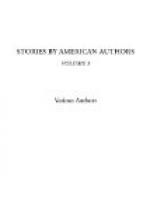I left the circus, and hundreds of others did the same. A dozen of us called at the box-office to ask about the victim of the accident. He was advertised as “The Great Polish Champion Bareback Rider and Aerial Gymnast.” We found that he was really a native of the East, whether Pole or Russian the ticket-seller did not know. His real name was Nagy, and he had been engaged only recently, having returned a few months before from a professional tour in North America. He was supposed to have money, for he commanded a good salary, and was sober and faithful. The accident, it was said, would probably disable him for a few weeks only, and then he would resume his engagement.
The next day an account of the accident was in the newspapers, and twenty-four hours later all Paris had forgotten about it. For some reason or other I frequently thought of the injured man, and had an occasional impulse to go and inquire after him; but I never went. It seemed to me that I had seen his face before, when or where I tried in vain to recall. It was not an impressive face, but I could call it up at any moment as distinct to my mind’s eye as a photograph to my physical vision. Whenever I thought of him, a dim, very dim memory would flit through my mind, which I could never seize and fix.
Two months later I was walking up the Rue Richelieu, when some one, close beside me and a little behind, asked me in Hungarian if I was a Magyar. I turned quickly to answer no, surprised at being thus addressed, and beheld the disabled circus-rider. It flashed upon me, the moment I saw his face, that I had seen him in Turin three years before. My surprise at the sudden identification of the gymnast was construed by him into vexation at being spoken to by a stranger. He began to apologize for stopping me, and was moving away, when I asked him about the accident, remarking that I was present on the evening of his misfortune. My next question, put in order to detain him, was:
“Why did you ask if I was a Hungarian?”
“Because you wear a Hungarian hat,” was the reply.
This was true. I happened to have on a little round, soft felt hat, which I had purchased in Buda Pesth.




